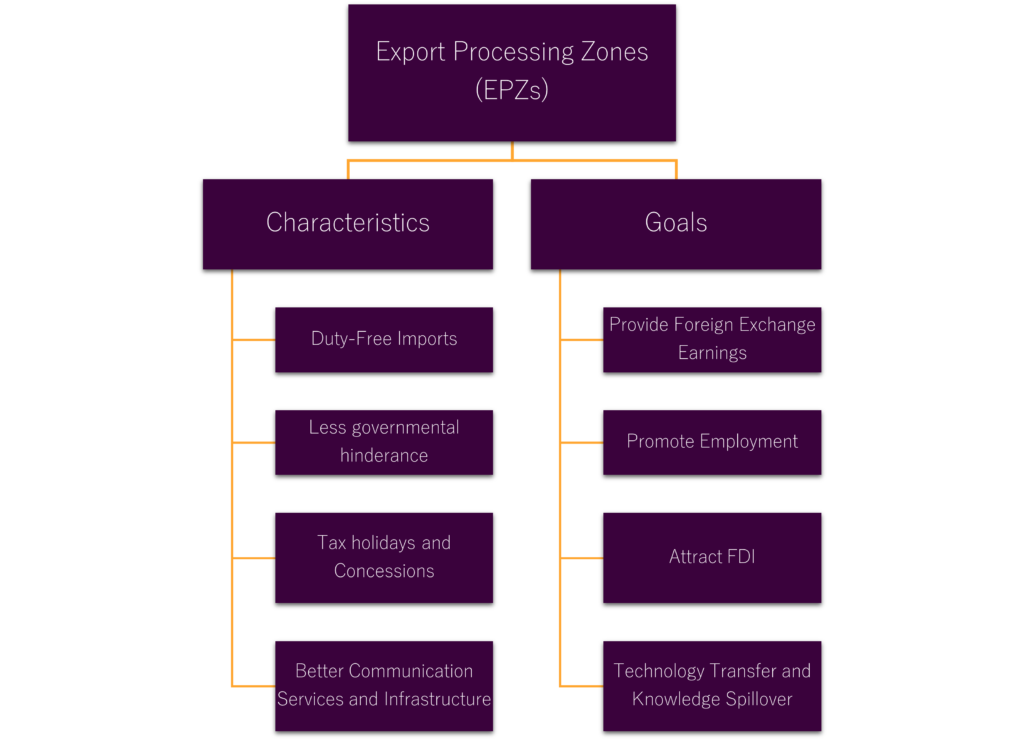By the mid-1980s, Asia alone boasted around 35 Export Processing Zones (EPZs), employing nearly 250,000 workers. Globally, the significance of EPZs further extended beyond Asia.
EPZs offer unique environments and also share a lot of characteristics with free trade zones, special economic zones, and industrial parks. They provide firms with free trade conditions and a relaxed regulatory framework. The main objectives of EPZs include boosting foreign exchange earnings, creating employment to combat unemployment, and attracting foreign direct investment. Hence, they are expected to facilitate technological transfer and knowledge sharing.
Econometrics Tutorials with Certificates
Definition, Characteristics and Goals

Export Processing Zones (EPZs) are designated as enclosed areas focused on export manufacturing. Moreover, they provide companies with free trade advantages and a relaxed regulatory framework. EPZs are notable for their ability to import raw materials, intermediate goods, and capital goods duty-free.
They also boast fewer bureaucratic hurdles, more flexible labour laws, and substantial tax breaks. Generally, the infrastructure and services within EPZs are superior to those found in the host country.
The main objectives of EPZs include generating foreign exchange through non-traditional exports, creating employment, and attracting foreign direct investment (FDI). By 1996, over 500 EPZs operated in 73 countries, a notable increase from a handful of EPZs in the 1970s.
Economic Rationale Behind Export Processing Zones
Foreign Exchange Earnings
EPZs are engineered to attract foreign investment, fostering export-oriented manufacturing growth. By providing a conducive business environment, they further encourage the production and export of non-traditional goods. Hence, this can significantly enhance a country’s foreign exchange reserves, essential for economic development and financial stability.
Tax Revenue and Tax Incentives
To lure companies into EPZs, host countries also extend various tax incentives. These include tax holidays, reduced corporate tax rates, and exemptions from import duties. While these concessions may initially reduce government revenue, they can lead to long-term economic gains through increased activity, job creation, and technology transfer.
Yet, the trade-off between lost tax revenue and the benefits of enhanced foreign exchange earnings and employment must be meticulously evaluated. Hence, policymakers must consider the economic rationale for EPZs against their possible drawbacks. This further ensures that these zones contribute positively to the host country’s economic development.
Foreign Direct Investment and Export Processing Zones
Export Processing Zones (EPZs) serve as a magnet for foreign direct investment (FDI), facilitating technological transfer and knowledge spillover. Moreover, these zones catalyze domestic entrepreneurship, encouraging the production of non-traditional goods. The United Nations Conference on Trade and Development reported over 3500 Special Economic Zones (SEZs) globally as of 2006.
EPZs are also a significant contributor to manufactured exports in developing countries. Additionally, many countries with EPZs focus on services. In India, the share of total electronics exports was around 33% in 2002, out of which almost 50% belonged to software exports. The first export processing zone in India was established in 1965 and the number grew significantly by 2003 which also helped propel Foreign Direct Investment in India.
| Region | Regions with EPZs for Services (2004) |
|---|---|
| Europe | 5 |
| Africa | 20 |
| Latin America and the Caribbean | 26 |
| Asia and the Pacific | 26 |
| Central and Eastern Europe | 13 |
The allure of EPZs in attracting foreign direct investment, technological transfer, and knowledge spillover positions them as a cornerstone of the FDI strategy for many developing nations.
Employment Generation and Skill Development
The establishment of export processing zones (EPZs) aims to combat unemployment and underemployment. As a result, these zones have been instrumental in creating a substantial number of jobs.
Job Creation and Women’s Employment in Local Economies
Export processing zones or EPZs contribute significantly to employment growth and lowering unemployment. For example, in India, total employment in EPZs was only 450 in 1970. However, with an increase in the number of EPZs, employment exploded and grew close to 90,000 in 2002.
Women are also a primary focus for employment in EPZs, with some sectors boasting a majority of female workers. Countries like China, Bangladesh, Pakistan, and Sri Lanka have implemented extensive EPZ strategies, significantly contributing to women’s employment. Despite these efforts, concerns persist regarding the working conditions in some EPZs, including low wages and insufficient investments in skills and technology.
While EPZs have been successful in generating jobs, the quality of these positions is also a pressing concern. Policymakers must address this issue, along with the need for robust labour regulations and human resource development, to maximize the benefits of these zones.
Environmental Concerns in Export Processing Zones
The rapid growth of Export Processing Zones (EPZs) has also significantly increased environmental concerns globally. These concerns usually center on pollution, waste management, and the detrimental effects on air, soil, water, and human health. Hence, it is imperative to address these environmental issues to ensure the successful development and management of EPZs.
The number of EPZs has grown rapidly, yet, environmental sustainability has often been overlooked. These zones frequently lack compliance and reporting mechanisms, leading to environmental abuse. They also often fail to integrate their activities into the broader economy, which could enhance environmental management and economic benefits.
| Environmental Sustainability Issues in EPZs | Proposed Solutions |
|---|---|
| Limited firm sizes and practices leading to environmental risks | Implement pollution abatement technology and renewable energy options |
| Lack of environmental management policies and practices | Develop and implement strategic management policies focusing on sustainability, linkages, and national development |
| Minimal technology adoption hindered by cost and inadequate labor skills | Enhance infrastructure and the business environment to improve competitiveness |
| Prevalence of corruption and lack of resources to control it | Implement policies to combat corruption, similar to those in South Africa |
To mitigate these environmental concerns, policymakers and EPZ management must develop strategies that meet international standards and best practices. By promoting sustainability, providing cost-effective services for CSR compliance, and focusing on economic, social, and environmental competitiveness, EPZs can serve as models for sustainable development in developing countries.
Export Processing Zones in the Context of Globalization
The world’s increasing interconnectedness has further highlighted the importance of export processing zones (EPZs) in the global economy. These zones operate within the framework of globalization, also interacting with regional trade agreements and the policies of the World Trade Organization (WTO).
WTO, Regional Trade Agreements and EPZs
Regional trade agreements (RTAs) have a profound impact on the policies and regulations surrounding EPZs. That is, these agreements can shape the incentives, tax structures, and operating environments within which EPZs function. For instance, the formation of regional blocs like the European Union has significantly influenced the landscape for EPZs in those regions. Therefore, policymakers need to understand the interplay between EPZs and RTAs to maximize the benefits of these specialized economic zones.
The World Trade Organization (WTO) has also played a critical role in shaping the policies and regulations governing EPZs. As globalization continues to evolve, the integration of EPZs with broader trade and economic policies will be a key consideration for their long-term viability and effectiveness.
Export Processing Zones: Key Policies and Best Practices
Export Processing Zones (EPZs) have become a cornerstone for many nations aiming to boost economic development and also draw in foreign capital. Through the experiences and insights gained from various EPZ initiatives globally, certain fundamental policies and best practices have emerged. As a result, these are essential for the success of these special economic zones.
Sound Macroeconomic Policies
Firstly, it is imperative to establish EPZ policies within a robust macroeconomic framework. This framework should ensure a stable exchange rate, controlled inflation, and a regulatory environment conducive to foreign direct investment (FDI). Such conditions are vital for fostering economic competitiveness.
Simplified and Moderate Corporate Tax Structures
Implementing tax incentives and streamlined corporate tax systems can significantly enhance the appeal of EPZs to investors. A balanced and consistent tax regime, avoiding excessive tax holidays, is more conducive to sustainable EPZ best practices and growth.
Private Sector Involvement and Management
Encouraging the private sector to drive development and management within EPZs can significantly boost operational efficiency. By entrusting the private sector with the management of infrastructure, utilities, and services, EPZs can foster a more dynamic and innovative environment.
Business-Friendly Labor Laws
Implementing EPZ policy recommendations that balance worker protection with a business-friendly environment is critical. This involves streamlined labour laws, fair working hours, and effective dispute resolution mechanisms. Such measures support both employers and employees.
Environmental Sustainability
Finally, it is essential to address the environmental impact of industrial activities within EPZs for long-term sustainability. EPZ policies must incorporate strategies to reduce pollution, manage waste, and conserve resources. This ensures a responsible and eco-friendly approach to industrial development.
Conclusion
Export processing zones (EPZs) have become a key policy tool for many nations. They offer substantial economic advantages, including foreign exchange gains, employment creation, and the attraction of foreign direct investment. Yet, the success of EPZs heavily relies on the overall economic and policy context. It also depends on the specific administrative and regulatory setup they operate within.
EPZs can be a powerful driver of development when integrated into a broader strategy of economic openness and global integration. Therefore, it is essential to weigh the benefits of EPZs against the challenges of labour and environmental concerns. This balance is critical for achieving sustainable, long-term economic growth.
The data on EPZs worldwide is striking, showing remarkable growth in employment and foreign investment in some areas. Yet, it also points to the need for policymakers to tackle the drawbacks. These include issues like wage disparities and environmental degradation. Addressing these concerns is also vital to fully harness the positive effects of EPZs on both economic and social development.
Econometrics Tutorials with Certificates
This website contains affiliate links. When you make a purchase through these links, we may earn a commission at no additional cost to you.


